YaBB - forum of the XX century
YaBB is a free Perl forum engine, the first version of which was released at the very end of the 20th century, on July 4, 2000. Yes, the 21st century, contrary to popular belief, began only on January 1, 2001.
On a time machine, we will transfer to the year 2000 and see how it all began.
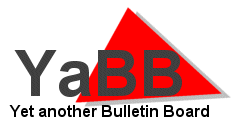
→ The demo version of the very first YaBB (login: admin, password: admin).
In the beginning of 2000, a certain Zef Hemel wanted to create its own forum and was looking for a suitable engine. The best of what he found were paid UBB (Ultimate Bulletin Board) for $ 200 and vBulletin, as well as free UltraBoard 1.62 and PowerBoard. However, these forums are tabular, and Zef wanted a tree in the “Usenet” style with blackjack and emoticons.
')
As a result, Zef Hemel chose a free UltraBoard and used it for a while. However, over time, he began to miss his opportunities, but he could not find a forum with the necessary functionality. Zef decides to create its own forum engine.
Since Zef Hemel initially wanted a tree forum, he began to modify the already existing RobBoard engine. While working on the forum, an insight came to him: tree forums lose popularity and are morally obsolete, since clicking on each message to read it is very inconvenient. Thus, he abandoned the idea to create a tree-like forum and rewrote it into a tabular one, which is how it still remains.
Initially, he wanted to make the engine paid, but then changed its position. He decided to make a free open source forum for as poor webmasters as himself. The first version of the forum engine was released on July 4, 2000, on US Independence Day. He called his engine YaBB - Yet another Bulletin Board. Translated from English, this means "Another Bulletin Board."
Soon, several more programmers joined the project: Andy Tomaka (UBB specialist), Remake (UltraBoard specialist), Matt Mecham (the creator of Ikonboard, later became the head of Invision Power Services). Zef has published its script in various directories of CGI programs, including the CGI-Resource Index.
The new engine was gaining popularity, it began to use sites with high traffic. The forum was constantly upgraded, a number of new versions were released over the years - YaBB 1 Final, YaBB 1 Gold, etc. Zef Hemel eventually abandoned the project, and new enthusiasts took over. Was released a huge variety of modifications collected on the BoardMod website.
The last of the line was YaBB 1 Gold - SP 1.4, released November 25, 2004.
Replaced by YaBB 2. The first public version in the Release Candidate status was released on December 27, 2004. Its main innovations are the ability to attach files to messages and create polls.
The latest version of this thread, 2.6.11, was released on December 17, 2014. YaBB 3 is under development.
On the basis of YaBB, a similar PHP engine was created using the MySQL DBMS, called YaBB SE . In turn, it became the basis of the now popular SMF engine (Simple Machines Forum) .
So, install the very first version of YaBB. It is worth clarifying that the following instructions are valid for servers running on Linux and FreeBSD operating systems.
The installer is missing, so the installation is done by simply copying the files to the cgi-bin folder (in text mode) and to the folder for HTML files (in binary mode). For files YaBB.pl , Printpage.pl , Search.pl , Reminder.pl set the appropriate access rights to allow their execution (usually 755). An administrator account has already been created (login: admin, password: admin).
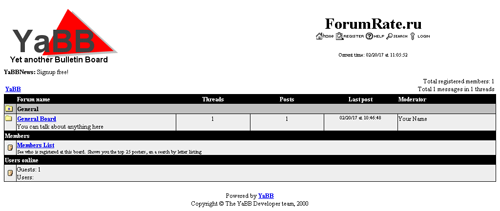
The forum engine is quite simple: you can create topics and write answers, receive notifications, search the forum, edit a profile, send a forgotten password via e-mail. There is a private messaging system.
An interesting feature: information about reading sections and topics is not recorded in cookies (as in most forums), but in text files on the server. Such a system is more stable. It is also convenient when the forum is accessed from several computers (for example, from home and work). The disadvantage is that this function only works for registered users, while the system that works through cookies is also available to guests.
When writing messages, you can use smiles and BBCode tags, the list of which is given in a small help to the forum. Buttons for inserting emoticons and tags are missing in the message creation window itself, so you have to enter them manually.
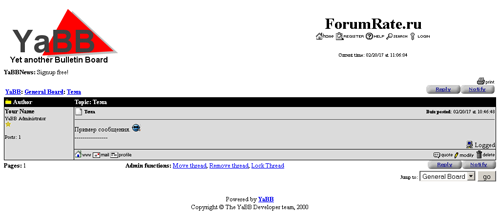
Moderation functions are quite simple: the message can be edited or deleted. The topic can be moved to another section of the forum, closed or deleted.
The user can edit his profile. As in any other forum engine, you can change your password, email address, specify the name and address of your site (if any), ICQ number and signature.
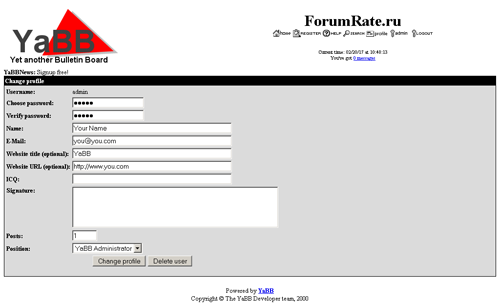
An interesting feature of YaBB, which is now rarely seen on the forums is the ability for any user to delete their account on their own. When editing a profile, you need to be especially careful, so that by chance, instead of “Change profile”, you do not click “Delete user”, since there will be no more warnings!
In addition to this, the administrator can edit the message counter and assign a user to the group. This can be either the standard group “YaBB Administrator” or a specially created one.
The ability to create groups exists to implement private forum categories, to which only specified groups of users will have access.
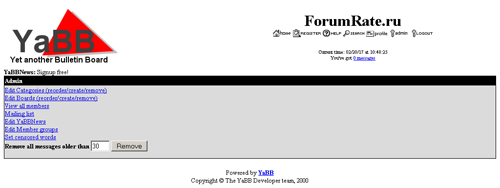
The forum administration panel is quite simple. However, it allows you to perform all the basic tasks:
The forum is written in Perl. It stores all data not in a DBMS, but in text files. For that time (the end of the 1990s - the beginning of the 2000s) it was a typical phenomenon - most of the engines (UBB, UltraBoard, etc.) worked with this technology.
These forum YaBB stores in 4 folders:
The YaBB forum has never been a leader in functionality. He initially conceded such a commercial project as UBB. But among the free forums (UltraBoard, Ikonboard), it looked pretty good. Continuous modernization, a large number of modifications - all this determined the success of the engine.
Many small forums of that time worked on YaBB, as well as some large ones. The largest Russian-language forum at YaBB has been and remains Absolute Games Forums Central .
However, since the 2nd half of the 2000s. YaBB began to lose ground. Among the main factors that influenced this are the distribution of free engines running on PHP and MySQL, as well as hosting with support for these technologies. Many forum owners have switched from YaBB to other engines (usually to SMF).
However, unlike other similar engines (UBB, Ikonboard, UltraBoard, etc.), YaBB did not stop developing, but continued to release new versions that are also written in Perl and store data in text files, but at the same time functionality is not inferior to the popular free forums in PHP and MySQL.
On a time machine, we will transfer to the year 2000 and see how it all began.

A bit of history
In the beginning of 2000, a certain Zef Hemel wanted to create its own forum and was looking for a suitable engine. The best of what he found were paid UBB (Ultimate Bulletin Board) for $ 200 and vBulletin, as well as free UltraBoard 1.62 and PowerBoard. However, these forums are tabular, and Zef wanted a tree in the “Usenet” style with blackjack and emoticons.
')
As a result, Zef Hemel chose a free UltraBoard and used it for a while. However, over time, he began to miss his opportunities, but he could not find a forum with the necessary functionality. Zef decides to create its own forum engine.
Since Zef Hemel initially wanted a tree forum, he began to modify the already existing RobBoard engine. While working on the forum, an insight came to him: tree forums lose popularity and are morally obsolete, since clicking on each message to read it is very inconvenient. Thus, he abandoned the idea to create a tree-like forum and rewrote it into a tabular one, which is how it still remains.
Initially, he wanted to make the engine paid, but then changed its position. He decided to make a free open source forum for as poor webmasters as himself. The first version of the forum engine was released on July 4, 2000, on US Independence Day. He called his engine YaBB - Yet another Bulletin Board. Translated from English, this means "Another Bulletin Board."
Soon, several more programmers joined the project: Andy Tomaka (UBB specialist), Remake (UltraBoard specialist), Matt Mecham (the creator of Ikonboard, later became the head of Invision Power Services). Zef has published its script in various directories of CGI programs, including the CGI-Resource Index.
The new engine was gaining popularity, it began to use sites with high traffic. The forum was constantly upgraded, a number of new versions were released over the years - YaBB 1 Final, YaBB 1 Gold, etc. Zef Hemel eventually abandoned the project, and new enthusiasts took over. Was released a huge variety of modifications collected on the BoardMod website.
The last of the line was YaBB 1 Gold - SP 1.4, released November 25, 2004.
Replaced by YaBB 2. The first public version in the Release Candidate status was released on December 27, 2004. Its main innovations are the ability to attach files to messages and create polls.
The latest version of this thread, 2.6.11, was released on December 17, 2014. YaBB 3 is under development.
On the basis of YaBB, a similar PHP engine was created using the MySQL DBMS, called YaBB SE . In turn, it became the basis of the now popular SMF engine (Simple Machines Forum) .
YaBB Original Release
So, install the very first version of YaBB. It is worth clarifying that the following instructions are valid for servers running on Linux and FreeBSD operating systems.
The installer is missing, so the installation is done by simply copying the files to the cgi-bin folder (in text mode) and to the folder for HTML files (in binary mode). For files YaBB.pl , Printpage.pl , Search.pl , Reminder.pl set the appropriate access rights to allow their execution (usually 755). An administrator account has already been created (login: admin, password: admin).

The forum engine is quite simple: you can create topics and write answers, receive notifications, search the forum, edit a profile, send a forgotten password via e-mail. There is a private messaging system.
An interesting feature: information about reading sections and topics is not recorded in cookies (as in most forums), but in text files on the server. Such a system is more stable. It is also convenient when the forum is accessed from several computers (for example, from home and work). The disadvantage is that this function only works for registered users, while the system that works through cookies is also available to guests.
When writing messages, you can use smiles and BBCode tags, the list of which is given in a small help to the forum. Buttons for inserting emoticons and tags are missing in the message creation window itself, so you have to enter them manually.

Moderation functions are quite simple: the message can be edited or deleted. The topic can be moved to another section of the forum, closed or deleted.
The user can edit his profile. As in any other forum engine, you can change your password, email address, specify the name and address of your site (if any), ICQ number and signature.

An interesting feature of YaBB, which is now rarely seen on the forums is the ability for any user to delete their account on their own. When editing a profile, you need to be especially careful, so that by chance, instead of “Change profile”, you do not click “Delete user”, since there will be no more warnings!
In addition to this, the administrator can edit the message counter and assign a user to the group. This can be either the standard group “YaBB Administrator” or a specially created one.
The ability to create groups exists to implement private forum categories, to which only specified groups of users will have access.

The forum administration panel is quite simple. However, it allows you to perform all the basic tasks:
- create, delete and sort categories and sections;
- display a list of users, as well as a list of their email addresses;
- edit news, user groups and a list of obscene words;
- delete all messages older than the specified number of days (30 by default).
Technical features
The forum is written in Perl. It stores all data not in a DBMS, but in text files. For that time (the end of the 1990s - the beginning of the 2000s) it was a typical phenomenon - most of the engines (UBB, UltraBoard, etc.) worked with this technology.
These forum YaBB stores in 4 folders:
- Boards - information about categories (* .cat) and sections (* .dat) , lists of topics in sections (* .txt) ;
- Members - user profiles (* .dat) , information about the sections and topics they visited (* .log) , incoming private messages (outgoing messages are not saved) (* .msg) ;
- Messages - topics files with messages (* .txt) , information about subscribing to notifications about new messages in the subject (* .mail) ;
- Variables - a list of categories (cat.txt) , user groups (membergroups.txt) , obscene words (censor.txt) , news (news.txt) , a list of users and guests online (log.txt) , default number of days, older which messages will be deleted from the admin panel (snormes.txt) , the topic id counter (number.txt) .
Conclusion
The YaBB forum has never been a leader in functionality. He initially conceded such a commercial project as UBB. But among the free forums (UltraBoard, Ikonboard), it looked pretty good. Continuous modernization, a large number of modifications - all this determined the success of the engine.
Many small forums of that time worked on YaBB, as well as some large ones. The largest Russian-language forum at YaBB has been and remains Absolute Games Forums Central .
However, since the 2nd half of the 2000s. YaBB began to lose ground. Among the main factors that influenced this are the distribution of free engines running on PHP and MySQL, as well as hosting with support for these technologies. Many forum owners have switched from YaBB to other engines (usually to SMF).
However, unlike other similar engines (UBB, Ikonboard, UltraBoard, etc.), YaBB did not stop developing, but continued to release new versions that are also written in Perl and store data in text files, but at the same time functionality is not inferior to the popular free forums in PHP and MySQL.
Source: https://habr.com/ru/post/322240/
All Articles